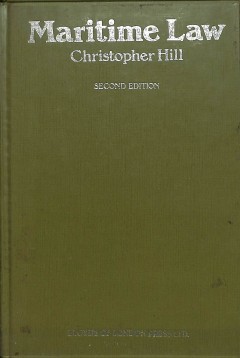Ditapis dengan

Firm-level Factor versus National Institutional Difference
When a firm undertakes foreign direct investment, it must determine the level of ownership in its foreign subsidiary. This study examines the determinants of the ownership strategy of a Japanese logistics firm from the perspective of international business studies (IB). The study focuses on firm-level factors, including “contributed assets” for shaping firm-specific advantage which a paren…
- Edisi
- Volume 30 Number 3 December 2014 pp. 393-414
- ISBN/ISSN
- -
- Deskripsi Fisik
- 14 p .
- Judul Seri
- Firm-level Factor versus National Institutional Difference: Ownership Structure in a Foreign Subsidiary of a Japanese Logistics Firm
- No. Panggil
- ATC LO END f C.1

Maritime Law
This book have several chapters become incresingly in need of updating. For example, the chapter on Limitation of Lialibility has, in this second edition, been given greater depth on the 1976 (London) Convention in view of itsnow imminent coming into effect. Also the very significant and controversial, court ruling in The Marion Case (at House of Lords level) has been written into the cahapter.…
- Edisi
- Second
- ISBN/ISSN
- 1-85044-045-X
- Deskripsi Fisik
- xxix, 382 p., : illus : 24 cm
- Judul Seri
- -
- No. Panggil
- TXT MR HIL m C.1

The ownership and management structure of container terminal concessions
It is now over 25 years since the widespread concessioning of container terminals began. This article examines the impact of concessioning on the balance between public and private sector control, the use of competitive tendering to assign concessions, the structure of the Special Purpose Vehicles (SPVs) to which concessions were originally awarded, and the way in which the ownership of these S…
- Edisi
- VOL. 39, NO. 1, 7–26
- ISBN/ISSN
- 1464–5254
- Deskripsi Fisik
- 22 p.
- Judul Seri
- Maritime Policy & Management: The flagship journal of international shipping and port research
- No. Panggil
- ATC LO FAR t

A stochastic frontier model of the efficiency of major container terminals in…
This paper applies a ‘port function matrix’ to analyse the administrative and ownership structures of major container ports in Asia. The relative efficiency of these ports is then assessed using the cross-sectional and panel data versions of the ‘stochastic frontier model’. The estimated efficiency measures are broadly similar for the two versions of the model tested. From the results o…
- Edisi
- 2002
- ISBN/ISSN
- -
- Deskripsi Fisik
- 21p
- Judul Seri
- Transportation Research Part A
- No. Panggil
- ATC LO CUL a

Chapter 10 port governance and privatization in the united states : public ow…
Owing to its history as a nation fashioned from a federation of relatively autonomous states, port governance in the United States is largely in the hands of those 50 states rather than the federal government. Evolving from accustomed private ownership in the 18th and 19th centuries, seaports in the US are now commonly owned by public agencies, governed by public boards and yet often operated b…
- Edisi
- Volume 17, 207–235
- ISBN/ISSN
- 0739-8859
- Deskripsi Fisik
- 29 p.
- Judul Seri
- -
- No. Panggil
- ATC PO FAW c

An empirical analysis of homeownership in urban China
This paper seeks to investigate the impact of socioeconomic factors of homebuyers such as gender, age, marital status, education, economic status and race on home ownership and loan decisions in urban China.
- Edisi
- VOL. 8 NO. 1 2014, pp. 1-17
- ISBN/ISSN
- -
- Deskripsi Fisik
- 18 p.
- Judul Seri
- Journal of Asia Business Studies
- No. Panggil
- ATC LO KAO a

The effect of family ownership and control on equity-based compensation: Evid…
Small public family firms apply contracting differently given the peculiar motivations of founding families and the degree to which they monitor operations. The purpose of this paper is to examine the effects of family ownership, control, and CEO dividends on CEO incentive compensation.
- Edisi
- Vol. 5 No. 1, 2015 pp. 55-72
- ISBN/ISSN
- -
- Deskripsi Fisik
- 19 p.
- Judul Seri
- Journal of Family Business Management
- No. Panggil
- ATC LO YOU t
 Karya Umum
Karya Umum  Filsafat
Filsafat  Agama
Agama  Ilmu-ilmu Sosial
Ilmu-ilmu Sosial  Bahasa
Bahasa  Ilmu-ilmu Murni
Ilmu-ilmu Murni  Ilmu-ilmu Terapan
Ilmu-ilmu Terapan  Kesenian, Hiburan, dan Olahraga
Kesenian, Hiburan, dan Olahraga  Kesusastraan
Kesusastraan  Geografi dan Sejarah
Geografi dan Sejarah